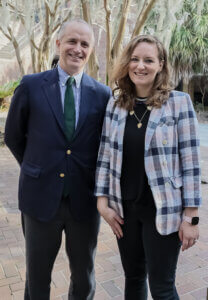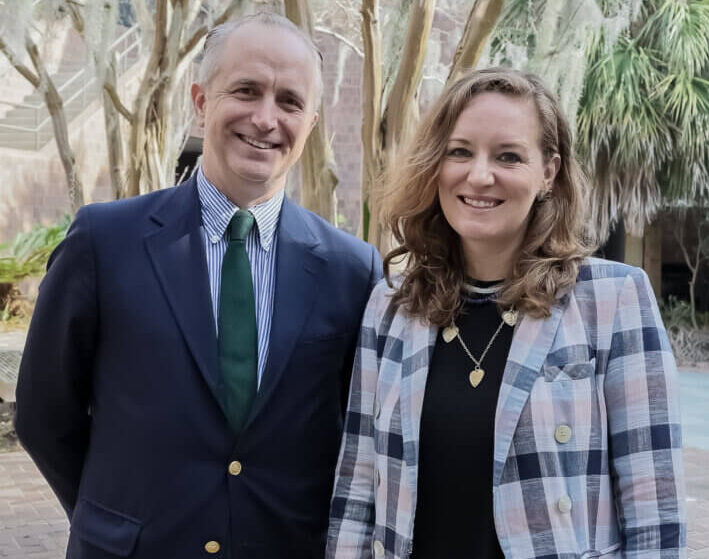Founders return to the stage for Law & Society symposium
 In Fall 2009, Will Cook was beginning his third year as an assistant professor at Charleston School of Law and Katie (Fowler) Monoc (’09) was beginning her final year as a law student.
In Fall 2009, Will Cook was beginning his third year as an assistant professor at Charleston School of Law and Katie (Fowler) Monoc (’09) was beginning her final year as a law student.
After meeting through a mutual friend, the professor/student relationship quickly blossomed into founders of the annual Law & Society symposium and, eventually, lifelong friends.
“Will became and remains one of my closest friends now,” she said.
But back in the day, Cook was teaching law and serving as faculty advisor for the Charleston Law Review, a publication that Monoc served as editor-in-chief. Driven by similar values and vision, they discussed the importance of creating a signature event that would address important societal issues of the moment through the lens of the law and society.
“This discussion about intersectionality was incredibly important to me,” said Cook. “Bringing together legal scholars, but also thought leaders and activists who can put these ideas into practice. They’re not just scholars for the sake of scholarship, but people who could implement those ideas on a societal scale. Legal education programs tend to focus solely on individual topics without any consideration of the policy or intersectionality of law and policy and other issues. We wanted to advance ideas.”
The one-of-a-kind symposium was an attractive concept, but the Law Review needed help.
Enter: Furman University.
“We thought it would be an ideal marriage between the Charleston Law Review and the Riley Institute,” said both Cook and Monoc. “So, we pitched our vision to Dr. Don Gordon and Jill Fuson at the Riley Institute, and they became our partner.”
And the journey began.
Monoc, then editor-in-chief of the Law Review, appointed a symposium editor and the group began the hard work of event planning and promotion.
“We were this fledgling law school and we wanted to raise the profile in both the state and the country,” she said. “We were doing the press. We were doing the marketing, the event planning. We created the panels. We were juggling a lot, but it was a passion project, and we were collaborating with people who we enjoyed; it didn’t feel like work, but a wonderful bonding experience and it pushed us all to a higher level of thought and action.”
The inaugural symposium – State Constitutional Reform in the New South – was “eye opening” for students, leaders and attendees. Topics included education as a legal right and Constitutional barriers to educational excellence, the judicial process in the state, legal reform, leadership and the future of the document.
The Charleston Regional Business Journal described the event:
This school (Charleston School of Law) is the real deal, and that was evident in the energy, enthusiasm, courage, vision and leadership that the organizers displayed … The symposium wasn’t just an academic exercise; the moderators asked tough questions and probed for real answers.
“It was a great example of a topic that most people don’t ever think about, but has incredible impact on their everyday lives,” said Cook. “There’s a strong correlation between provisions in state constitutions and social consequences. That was incredibly interesting to explore.”
The time and effort invested in making the first Law & Society symposium a success can been seen year-after-year, generation-to-generation over the last 15 years, all building on the foundation that was built.
Ironically, Monoc (moderator) and Cook (panelist) were back on stage at the 15th annual Law & Society symposium last week. They are now celebrated as founders of the signature event at the Charleston School of Law.
“All of the things that you see today, we did that first year,” said Monoc. “The thoughtfulness and the reverence law students have for the event, is impressive. It’s very rewarding to see the level of care. It was awesome to be a part of creating the future for the law school in this way, using the flagship law review as a vehicle.”
“It’s incredibly gratifying,” said Cook. “It’s not only continued, but that it’s thriving. Katie helped create this structure that has allowed it to thrive. It’s wonderful to see that the idea and inspiration remain. The students obviously are a critical part of that through the Charleston Law Review, but also having the continued involvement through the Riley Institute has played a big role in that too.”
The 15th annual Law & Society symposium featured legal, academic, and climate experts discussing legal and legislative trends emerging from climate change. The symposium is presented by the Charleston Law Review and the Riley Institute at Furman University.


